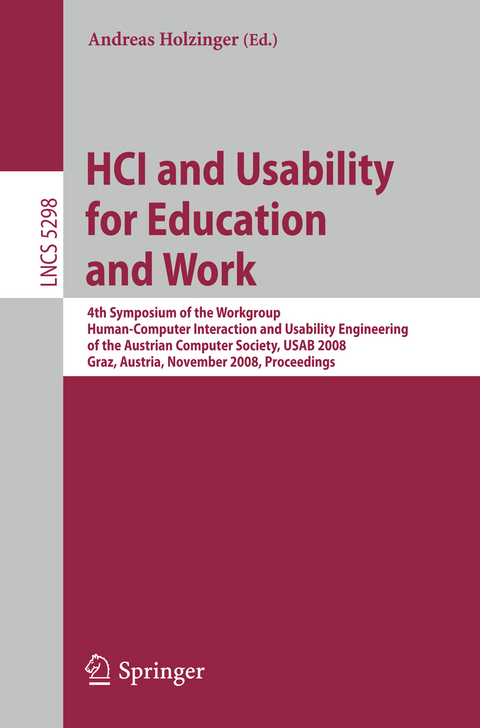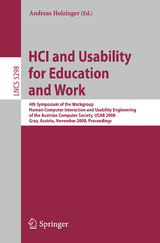HCI and Usability for Education and Work
Springer Berlin (Verlag)
978-3-540-89349-3 (ISBN)
Ing. Mag. rer. nat. Mag. phil. Dr. phil. Andreas Holzinger, geb. 1963 in Graz, Radio- und Fernsehtechniker, Industrietätigkeit in der Informationstechnik, Werkmeister für Industrielle Elektronik und Lehrlingsausbilderprüfung. College of Further Education Bournemouth (England) mit Schwerpunkt Computertechnik. Studien der Nachrichtentechnik, Physik und Psychologie sowie Medienpädagogik und Soziologie an der TU und Uni Graz. Promotion mit 'summa cum laude' auf dem Gebiet der Kognitionswissenschaft. Hochschullehrer am Institut für Informationsverarbeitung und computergestützte neue Medien der TU-Graz. Vorstandsassistent am Institut für medizinische Informatik, Statistik und Dokumentation. Konsulent des österreichischen Wissenschaftsministeriums. Österreichischer Experte in der Europäischen Union im Bereich Multimedia (eEurope). Dr. Holzinger forscht, arbeitet und lehrt in den Gebieten: Informationssysteme, Multimedia, Human-Computer-Interaction, Internet/Intranet, Intelligente Tutorielle Systeme.
Cognitive Processes and End User Experience.- Learners, Technology and the Brain.- Challenges in the Development and Evaluation of Immersive Digital Educational Games.- Evaluating the Motivational Value of an Augmented Reality System for Learning Chemistry.- Cognitive Processes Causing the Relationship between Aesthetics and Usability.- Educational Uses of the e-Book: An Experience in a Virtual University Context.- Construction and Evaluation of a User Experience Questionnaire.- Social Software and Collaborative Knowledge Development.- Integration of a Wiki for Collaborative Knowledge Development in an E-Learning Context for University Teaching.- Web 2.0 and Social Software: Challenges and Complexity of Communication in Education.- Using ePortfolios Enhancing for Learning through Computer-Mediated Interaction in a Course on HCI.- Knowledge Processing, Assessment and Human Performance.- Knowledge-Based Patterns of Remembering: Eye Movement Scanpaths Reflect Domain Experience.- Knowledge Assessment Based on Evaluation of 3D Graphics Annotation in Lesson Context.- The Influence of Instruction Mode on Reaching Movements during Manual Assembly.- Usability Metrics of Time and Stress - Biological Enhanced Performance Test of a University Wide Learning Management System.- Human Centered Development and Design Accessibility.- Users' Experience with a Recommender System in an Open Source Standard-Based Learning Management System.- The Role of Usability in the Design and Evaluation of Dynamic Traffic Displays.- Affordances in Conversational Interactions with Multimodal QA Systems.- E-Learning: A Tool for Teachers with a Disability.- More Than Just a Game: Accessibility in Computer Games.- User Centred Information Visualization and Multimedia.- Visualizations at First Sight: DoInsights Require Training?.- PowerPoint Multimedia Presentations in Computer Science Education: What Do Users Need?.- Analysis of Ontology Visualization Techniques for Modular Curricula.- Agile User-Centered Design Applied to a Mobile Multimedia Streaming Application.- Adaptivity and Personalization in Ubiquitous Learning Systems.- Adaptivity and Personalization in Ubiquitous Learning Systems.- Instruction Formats and Navigation Aids in Mobile Devices.- HCI Research for E-Learning: Adaptability and Adaptivity to Support Better User Interaction.- Personalized E-Learning through Environment Design and Collaborative Activities.- Avatars in Assistive Homes for the Elderly.- Using Clustering Technique for Students' Grouping in Intelligent E-Learning Systems.- Adaptation Criteria for Preparing Learning Material for Adaptive Usage: Structured Content Analysis of Existing Systems.- Human Centred Design for Safety Critical Systems.- How Image Based Factors and Human Factors Contribute to Threat Detection Performance in X-Ray Aviation Security Screening.- A Process for Human Centered Modelling of Incident Scenarios.- Design Patterns Applied in a User Interface Design (UID) Process for Safety Critical Environments (SCEs).- Under Watch and Ward at Night: Design and Evaluation of a Remote Monitoring System for Dementia Care.
| Erscheint lt. Verlag | 13.11.2008 |
|---|---|
| Reihe/Serie | Lecture Notes in Computer Science | Programming and Software Engineering |
| Zusatzinfo | XVI, 488 p. |
| Verlagsort | Berlin |
| Sprache | englisch |
| Maße | 155 x 235 mm |
| Gewicht | 771 g |
| Themenwelt | Mathematik / Informatik ► Informatik ► Betriebssysteme / Server |
| Informatik ► Software Entwicklung ► User Interfaces (HCI) | |
| Schlagworte | 3D graphics annotation • Accessibility • augmented reality • brain training • Case-Based Reasoning • cognitive processes • Conceptual Design • Decision Making • digital educational games • E-Book • Educational Software • elderly people • E-Learning • formal methods • Hardcover, Softcover / Informatik, EDV/Betriebssysteme, Benutzeroberflächen • HCI • HC/Informatik, EDV/Betriebssysteme, Benutzeroberflächen • Health Care • Human Computer Interaction • Human-Computer Interaction (HCI) • Human Factors • Information Visualization • Knowledge • knowledge evaluation • learning • Medical Informatics • Mobile Learning • Multimedia • Performance Measurement • Pervasive Computing • Recommender Systems • Reusability • Simulation • Social Software • Usability • User Centered Design • User Experience • User Experience (UX) • Virtual Reality • Visual Analytics • Web 2.0 • Wiki |
| ISBN-10 | 3-540-89349-0 / 3540893490 |
| ISBN-13 | 978-3-540-89349-3 / 9783540893493 |
| Zustand | Neuware |
| Haben Sie eine Frage zum Produkt? |
aus dem Bereich




